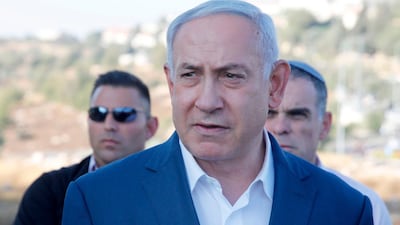A war of words has erupted between Israeli Prime Minister Benjamin Netanyahu and extreme-right legislators jockeying for power a month ahead of crucial elections for the embattled leader.
These domestic debates led Mr Netanyahu to reverse course on Sunday and allow non-Muslims to enter the Al Aqsa compound during Eid Al Adha celebrations in response to pressure from his rivals.
The heads of Israel’s security services last week presented a plan to the prime minister to bar non-Muslims from the compound, which Jews call the Temple Mount, on Sunday. Mr Netanyahu has the power to veto such plans if he chooses.
The Muslim festival coincided this year with Tisha B’av, a Jewish holiday mourning the destruction of Jewish temples on the same site. Jews have previously been allowed access to the Al Aqsa compound on this holiday, but not to pray there.
Clashes erupted between Israeli police and Muslim worshippers at the already-tense site on Sunday morning, injuring 61 Palestinians, according to the Red Crescent. Violent flare-ups are frequent here, as Palestinians fear that Israel is trying to assert sovereignty over the compound, which includes the Haram Al Sharif mosque.
As the tear gas settled, Mr Netanyahu’s competitors to the right starting lambasting the prime minister for allowing Jews to be barred from entering the site.
Extreme-right Transportation Minister Bezalel Smotrich called the temporary ban “shameful and a disgrace” and tweeted: “The decision is a surrender to Arab terrorism and violence at the holiest place in Judaism and is why there is a loss of deterrence in other areas.”
Mr Smotrich is part of the United Right electoral alliance, headed by Mr Netanyahu's rival Ayeled Shaked, who blamed the prime minister for the day’s events in similarly fiery language.
Mr Netanyahu needs the United Right’s support but is also worried about the alliance drawing too many votes in the upcoming election.
Mr Netanyahu won elections in April but failed to form a ruling coalition after his ally-turned-rival Avigdor Lieberman refused to join the government over a dispute about a law conscripting ultra-Orthodox Jews.
In a bid to save his political career, Mr Netanyahu, who faces indictment on corruption charges, called a new election in September. In order to maintain a Netanyahu-led right-wing government, his ruling Likud party needs as many votes as possible to avoid having to depend on many smaller parties to form a coalition.
In recent weeks, Likud’s campaign has had one main message: vote for Likud and not a smaller right-wing party, or risk losing the government to the left. Mr Netanyahu is therefore walking a fine line, both needing to reign in United Right, but also not wanting to alienate right-wing voters over key issues and push them towards the alliance instead.
Consequently, Mr Netanyahu reversed course later on Sunday and announced that “after consultations with all security bodies … this year, like all years, Jews will enter the Temple Mount on Tisha B’Av, even when it is a Muslim holiday. The question was never whether they would enter, but how to manage it optimally for the public’s safety, which is exactly what we did.”
He added, in reference to United Right’s tweets: “I am not impressed by all the recommendations of the Twitter cabinet.”
In the end, 1,729 Jews entered the compound on Sunday in contrast to 1,440 last year, according to Public Security Minister Gilad Erdan.
Mr Netanyahu’s move brought swift condemnation from Jordan and Saudi Arabia, among other countries.
But it was not enough to satisfy Mr Smotrich, who has made controversial and incendiary comments before. He has called himself a “proud homophobe” and for Israel to be run by Torah law. Last year his Twitter account was temporarily suspended when he said Ahed Tamimi, the Palestinian teenager filmed slapping an Israeli soldier, should be shot.
On Monday, Mr Netanyahu summoned Mr Smotrich for a meeting over his repeated criticisms, reportedly at the behest of angry Likud members. According to a Likud source, Mr Netanyahu ordered Mr Smotrich to apologise for “the incitement against” him and warned he would be fired if he did it again. The minister apologised, for now.

